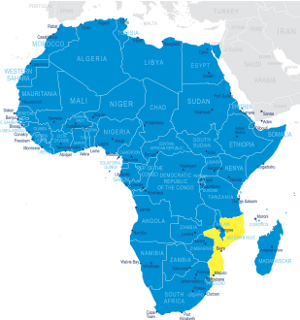
| Feb. 2014 | |||||||||||
| Top stories | |||||||||||
| In the news | |||||||||||
| Photos | |||||||||||
| Contact us | |||||||||||
| Archive | |||||||||||
|
Public Health laboratories reach out to global partners |
In the last four years, Lucy DesJardin, Ph.D., has traveled to three continents to improve local public health programs. Most recently, a mission took the director of the Office of Research Development at the State Hygienic Laboratory to Mozambique.

DesJardin and a colleague from the Massachusetts public health laboratory represented the Association of Public Health Laboratories during the trip to the southeast African country in late January.
The trip to the capital of Maputo included a lengthy 14-hour flight from Atlanta to Johannesburg, which DesJardin noted is the longest single flight Delta offers.
Their task on the five-day mission was to assess the laboratory in Maputo as part of the International Influenza Laboratory Assessment's mission to develop and enhance laboratory capacity for seasonal and pandemic influenza surveillance.
The Centers for Disease Control and Prevention's Influenza Division provides funding for the work in more than 40 countries that request laboratory assessments. Two CDC representatives also made the trip to assess the non-laboratory related aspects of the surveillance program.
DesJardin said her role was to assess the lab's equipment and workflow and help the local staff with processes if necessary. This included test methods and protocols such as how to transport specimens to the lab.
"This visit was to figure out what their capacity was and what they needed to do to become a fully functional national surveillance lab," she said.
The lab's instruments were fairly up-to-date, as they had been received during the 2009 H1N1 pandemic, DesJardin noted, and the staff members were passionate about their work and highly skilled.

"What was so wonderful about the lab was the enthusiasm they had," she said, citing the benefit the staff felt they were providing for their country.
The same was true during DesJardin's other two public health missions. She made her first trip in 2010 to Rio de Janeiro and later went to Fiji in the South Pacific.
"Each place is so different," DesJardin said.
Brazil was "top of their game" with doctoral level scientists engaged in influenza research in addition to the laboratory’s testing personnel. Fiji's infrastructure was more similar to that in Maputo, she said.
DesJardin's two previous trips were lab reassessments. Her January trip to Mozambique was the first visit for the lab that is just developing its program.
Although she didn't get to see much of Maputo, she describes the weather as superb. While the days were hot, the Indian Ocean, which borders the city to the east, made a difference at night.
"Every evening, they get the breeze off the ocean, and it was just beautiful," DesJardin said.
After reports from the trip are finished, DesJardin and the teams from CDC and Mozambique met via conference calls to determine the next steps.
"Our goal is to meet their needs," DesJardin said, adding that she finds the work rewarding. "You really have an opportunity to advocate for the country’s program and hopefully do some good."